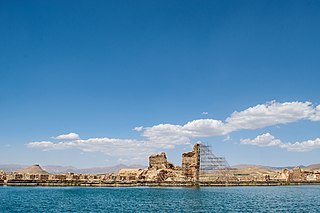Related Research Articles

Atropatene, also known as Media Atropatene, was an ancient Iranian kingdom established in c. 323 BC by the Persian satrap Atropates. The kingdom, centered in present-day northern Iran, was ruled by Atropates' descendants until the early 1st-century AD, when the Parthian Arsacid dynasty supplanted them. It was conquered by the Sasanians in 226, and turned into a province governed by a marzban ("margrave"). Atropatene was the only Iranian region to remain under Zoroastrian authority from the Achaemenids to the Arab conquest without interruption, aside from being briefly ruled by the Macedonian king Alexander the Great.

Phraates II was king of the Parthian Empire from 132 BC to 127 BC. He was the son and successor of Mithridates I.

Orodes III was king of the Parthian Empire from 4 to 6. Albeit he was an Arsacid, his lineage is unknown. He was raised to the throne by the nobility two years after the death of the previous co-rulers, Phraates V and Musa. Information regarding the brief reign of Orodes III is lacking. He was killed after a reign of 2 years. He was succeeded by Vonones I.

Mithridates IV was a Parthian king from to 57 to 54 BC. He was the son and successor of Phraates III. Mithridates IV's reign was marked by a dynastic struggle with his younger brother, Orodes II, who eventually emerged victorious and had Mithridates IV executed, thus succeeding him.

Sinatruces was king of the Parthian Empire from c. 75 BC to c. 69 BC. Some sources indicate that he could have been a son of the Parthian ruler Mithridates I, and a half-brother of Phraates II. David Sellwood, historian, designates Sinatruces as a probably younger brother of Mithridates I. Sinatruces was succeeded by his son Phraates III.

Richard Nelson Frye was an American scholar of Iranian and Central Asian studies, and Aga Khan Professor Emeritus of Iranian Studies at Harvard University. His professional areas of interest were Iranian philology and the history of Iran and Central Asia before 1000 CE.
Intellectual movements in Iran involve the Iranian experience of modernity and its associated art, science, literature, poetry, and political structures that have been changing since the 19th century.

Iranian studies, also referred to as Iranology and Iranistics, is an interdisciplinary field dealing with the research and study of the civilization, history, literature, art and culture of Iranian peoples. It is a part of the wider field of Oriental studies.
Ramin Jahanbegloo is an Iranian philosopher and academic based in Toronto, Canada.

Iraj Bashiri is professor of history at the University of Minnesota, United States, and one of the leading scholars in the fields of Central Asian studies and Iranian Studies. Fluent in English, Persian, Tajik, and several Turkic languages, Bashiri has been able to study and translate works otherwise inaccessible to the mostly Russian-speaking Central Asian studies community. Bashiri’s career focus started on Iran, and engaged also with Central Asia, notably the Tajik identity and the relations between Tajiks and the Turkic people of Central Asia, namely the Uzbeks.

Andragoras was an Iranian satrap of the Seleucid provinces of Parthia and Hyrcania under the Seleucid rulers Antiochus I Soter and Antiochus II Theos. He later revolted against his overlords, ruling independently from 245 BC till his death.
John E. Woods is a Professor Emeritus of Iranian and Central Asian History in the Departments of History and of Near Eastern Languages and Civilizations and the College at the University of Chicago.

History is the systematic study and documentation of the human past.

Mehrdad Pooladi is an Iranian former professional footballer. He was also an Iranian international, where he played as a left back.

Mirzā Abdul'Rahim Tālibi Najjār Tabrizi, also known as Talibov, was an Iranian Azerbaijani intellectual and social reformer. He was born in the Sorkhab district of Tabriz, Iran. Both his father, Abu-Tālib Najjār Tabrizi, and grandfather, Ali-Morad Najjār Tabrizi, were carpenters. No information concerning the maternal side of his family is available.

Hazin Lahiji, was an Iranian historian, theologian and philosopher.
The Association for Iranian Studies (AIS), formerly the International Society for Iranian Studies (ISIS), is a private, non-profit academic organization founded in 1967 in the United States, though it now counts upwards of 1,000 members around the world. The current president is Naghmeh Sohrabi, Brandeis University.

Adur Gushnasp was the name of a Zoroastrian sacred fire of the highest grade, which served as one of the three most sacred fires of pre-Islamic Iran; the two others being the Adur Farnbag and Adur Burzen-Mihr. Out of the three, Adur Gushnasp is the only fire whose temple structure has been discovered and "for which archaeological, sigillographical, and textual evidence are all available."
Sadeq Kia was an Iranian man of letters, distinguished professor of Iranian languages and the president of the second Academy of Persian Language and Literature.

Qanun was a monthly newspaper which was published in London during the period 1890–1898. The founder and editor of the paper was Mirza Malkam Khan who served as the Qajar Iran's envoy to Britain and Italy. It is known to be the first oppositional publication of Iran and was one of the publications which improved the political awareness of Iranians.
References
- ↑ "Our Faculty and Staff: Mehrdad Kia". umt.edu. Retrieved 21 August 2022.
- ↑ O'Brien, Edward (4 January 2020). "UM Professor: Iran Attack 'The Beginning Of A New Process'" . Retrieved 21 August 2022.